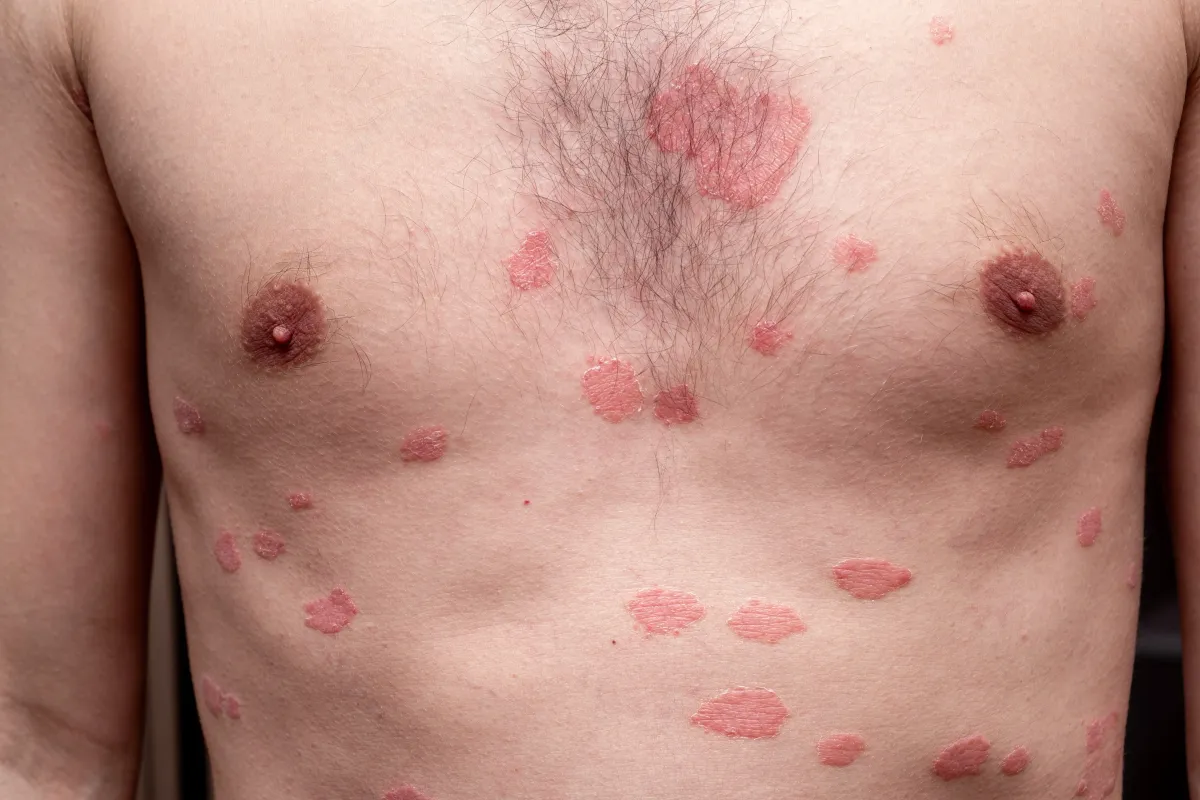Psoriasis: Gut Health
Psoriasis is a chronic autoimmune skin disorder causing red, scaly patches, often managed through topical treatments, phototherapy, systemic medications, and lifestyle modifications.

Description of Psoriasis:
Psoriasis is a chronic, autoimmune skin disorder that accelerates the growth cycle of skin cells, leading to the development of scaling on the skin's surface. It often results in patches of skin that are red, itchy, and scaly. Psoriasis can occur anywhere on the body, but it most frequently affects the elbows, knees, scalp, and lower back.
Symptoms:
Plaques of Red Skin: These are often covered with silvery scales and may be itchy or painful. Sometimes, the skin will crack and bleed.
Nail Changes: Psoriasis may also affect the nails, causing pitting, abnormal nail growth, and discoloration.
Itchy and Burning Sensations: Affected areas can be quite itchy and sometimes painful.
Dry and Cracked Skin: This may occur and can sometimes bleed.
Stiff and Swollen Joints: Some people with psoriasis also develop psoriatic arthritis, which involves swollen and painful joints.
Causes: The exact cause of psoriasis is not entirely understood, but it is believed to be related to an immune system problem involving T cells and other white blood cells called neutrophils. In people with psoriasis, T cells mistakenly attack healthy skin cells as if to heal a wound or to fight an infection, triggering the overproduction of new skin cells. Factors that may trigger psoriasis include infections, skin injuries, stress, smoking, heavy alcohol consumption, and specific medications.
Genetics also play a role, with a tendency for psoriasis to run in families.
Treatment Options:
While there is no cure for psoriasis, many treatments are available to help control its symptoms:
Topical Treatments:
Corticosteroids Vitamin D analogues Salicylic acid Coal tar Phototherapy: Exposure to ultraviolet (UV) light under medical supervision. Sunlight can also be beneficial.
Systemic Medications:
For more severe cases, options include: Methotrexate Cyclosporine Biologic drugs that target specific parts of the immune system.
Lifestyle Modifications:
Maintaining a healthy lifestyle can aid in reducing flare-ups: Use of moisturizers for skin hydration. Stress reduction techniques. Avoidance of known triggers like smoking and alcohol.
Dietary Adjustments: Some people find relief with adjustments tailored to their specific needs, as seen in some treatments based on blood type or specific diets. Due to the chronic nature of psoriasis, ongoing treatment and lifestyle management are usually required to manage the condition effectively. Always consult with a healthcare professional for a diagnosis and to devise a treatment plan suited to individual needs.
role of Gut Imbalances in Psoriasis:
Psoriasis is a chronic autoimmune condition that primarily affects the skin, leading to the rapid build-up of skin cells and the formation of scales and red patches that can be itchy and sometimes painful. While the exact cause of psoriasis is not fully understood, it involves an interplay of genetic factors, immune system dysfunction, and environmental triggers. Recent research has explored the potential role of gut health, specifically gut imbalances, in influencing psoriasis.
Introduction to Gut Imbalances: Gut imbalances, or dysbiosis, refer to the disruption of the natural balance of microorganisms in the gastrointestinal tract. This imbalance can impact various bodily functions, including immune system regulation. The gut microbiome plays a critical role in immune function; thus, an unhealthy microbiome may contribute to conditions characterized by immune dysregulation, such as psoriasis.
How Gut Imbalances Might Affect Psoriasis: The immune system and the gut are intricately linked through the gut-associated lymphoid tissue and the various compounds produced by gut microbes. Dysbiosis can lead to increased intestinal permeability, commonly known as "leaky gut," which allows bacteria, toxins, and undigested food particles to enter the bloodstream. This can trigger systemic inflammation, potentially exacerbating autoimmune responses in conditions like psoriasis. Though direct evidence linking gut imbalances and psoriasis is emerging, the inflammatory cascade driven by an unhealthy gut could be a contributing factor to psoriasis flare-ups.
Research and Scientific Findings: Current studies suggest that individuals with psoriasis often have a less diverse gut microbiome compared to those without the condition. Some research indicates that specific gut bacteria, when in reduced numbers, may play a role in maintaining skin health by modulating inflammatory processes. Moreover, some ongoing studies are examining how probiotic supplementation or dietary changes aimed at restoring healthy gut flora might improve psoriasis symptoms.
Improving Gut Health to Manage Psoriasis: Potential ways to address gut imbalances in people with psoriasis include dietary interventions, such as increased intake of fiber-rich and fermented foods that can support beneficial bacteria in the gut. Probiotics and prebiotics can help rebalance the gut microbiota and may reduce systemic inflammation. Moreover, lifestyle changes like stress management and regular physical activity can also promote a healthy gut environment.
Conclusion: While direct links between gut imbalances and psoriasis require further research, the existing evidence suggests that maintaining a healthy gut microbiota could help in managing psoriasis symptoms and reducing inflammation. Those with psoriasis may want to consider interventions aimed at improving gut health as a complementary approach to traditional treatment methods, ideally under the guidance of a healthcare provider.
